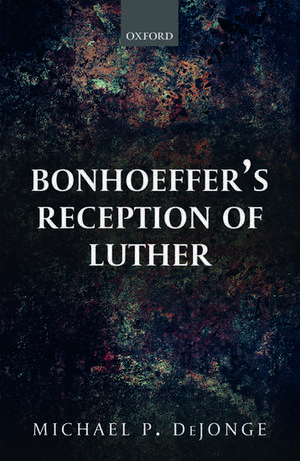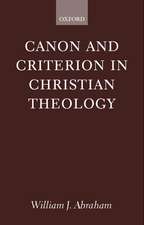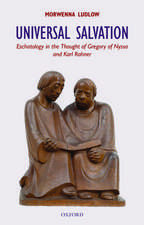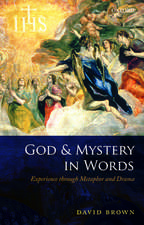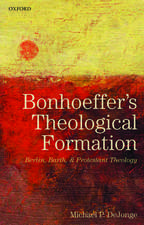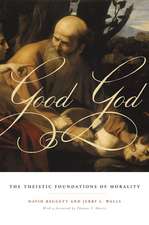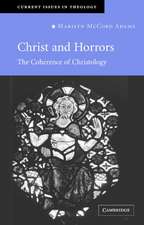Bonhoeffer's Reception of Luther
Autor Michael P. DeJongeen Limba Engleză Hardback – 9 feb 2017
Preț: 614.67 lei
Preț vechi: 842.56 lei
-27% Nou
Puncte Express: 922
Preț estimativ în valută:
117.62€ • 123.11$ • 97.89£
117.62€ • 123.11$ • 97.89£
Carte tipărită la comandă
Livrare economică 19-25 martie
Preluare comenzi: 021 569.72.76
Specificații
ISBN-13: 9780198797906
ISBN-10: 0198797907
Pagini: 294
Dimensiuni: 179 x 235 x 22 mm
Greutate: 0.61 kg
Editura: OUP OXFORD
Colecția OUP Oxford
Locul publicării:Oxford, United Kingdom
ISBN-10: 0198797907
Pagini: 294
Dimensiuni: 179 x 235 x 22 mm
Greutate: 0.61 kg
Editura: OUP OXFORD
Colecția OUP Oxford
Locul publicării:Oxford, United Kingdom
Recenzii
Bonhoeffer's Reception of Luther by Michael DeJonge is probably one of the most important books on Bonhoeffer that have come out in recent years...It will help future Bonhoeffer scholars avoid the mistakes that many have made in the (recent) past. Both for the sake of the legacy of Bonhoeffer and the faithful application of Bonhoeffer for our time, the value of this book can hardly be overstated.
This book will undoubtedly become an important resource for Bonhoeffer scholarship, providing general readers with a more comprehensive understanding of Bonhoeffer and his theological thought.
DeJonge emphasizes the importance of Luther's legacy for central themes of Bonhoeffer's theology and ethics. This is to be welcomed in view of widespread misjudgements, especially in English-speaking research.
"Collectively, the essays are fresh, engaging, interesting and nourishing food for thought. As the editors hoped, they breathe new life into some fairly well worn topics - e.g. miracles, faith, fine-tuning arguments, Pascal's wager, religious diversity, religious disagreement, religious expertise and religious experience - and raise some less familiar topics - e.g. disagreement between Aquinas and Scotus on testimony, disagreement between Henry (of Ghent) and Scotus on divine illumination, Maimonides's views on repentance, and reasoning about infinite universes - to greater prominence.
In this masterful study of the relatio nship between Dietrich
With this contribution, DeJonge further establishes himself as one of the most historically sensitive interpreters of Bonhoeffer in English. DeJonge's work immediately becomes standard fare for any graduate consideration of Bonhoeffer while the depth, scope, and significance of the argument for Bonhoeffer studies as a whole should not be underestimated. It is difficult to imagine a faithful reading of Bonhoeffer's theology that does not engage DeJonge's argument... Bonhoeffer's Reception of Luther stands as an impressive and considerable contribution to both Bonhoeffer studies specifically and political theology generally.
Michael P. DeJonge's recently-released work, Bonhoeffer's Reception of Luther, from Oxford University Press, digs deep to trace Bonhoeffer's development as a theologian, arguing, unconventionally for an English-language volume, that he was a remarkably consistent student of Luther throughout his career.
This work will be essential for anyone interested in the development of Bonhoeffers theology. Michael DeJonge writes with remarkable clarity about some of the more complex and contested aspects of Bonhoeffers thought, offering provocative new insights into Bonhoeffers approach to the two kingdoms, Christian pacifism, and the challenges of resistance. Without ignoring the other theological influences on Bonhoeffers thought, this book makes a convincing case that to understand Bonhoeffer we must examine his reading and interpretation of Luther.
In this new work, rising star Michael DeJonge executes a lucid, patient and in the end devastating critique of North American readings of Dietrich Bonhoeffer's theological legacy. That alone is worth the price of admission. Even better is the extraordinary retrieval he makes of Bonhoeffer's core Lutheranism. DeJonge understands Luther better than many a Lutheran and Bonhoeffer better than any other North American interpreter.
DeJonges meticulously-researched, contextually-grounded analysis of Bonhoeffer's frequent appropriate of Luthers thought and specific Lutheran elements of his application of the biblical message to the mid-twentieth century world combines with the authors critical engagement with scholars who have minimized and misinterpreted Bonhoeffers deep immersion in the reformers theology. DeJonge confirms the estimation of Bonhoeffers own associates who recognized their friends appreciation of and reliance on Luthers thought in a clearly-stated, convincing argument. This volume offers sharper and deeper insights into Bonhoeffers ever more relevant assessment of the Christian gospel, the church, and society, and thus it points Bonhoeffer studies in new, exciting directions.
This book will undoubtedly become an important resource for Bonhoeffer scholarship, providing general readers with a more comprehensive understanding of Bonhoeffer and his theological thought.
DeJonge emphasizes the importance of Luther's legacy for central themes of Bonhoeffer's theology and ethics. This is to be welcomed in view of widespread misjudgements, especially in English-speaking research.
"Collectively, the essays are fresh, engaging, interesting and nourishing food for thought. As the editors hoped, they breathe new life into some fairly well worn topics - e.g. miracles, faith, fine-tuning arguments, Pascal's wager, religious diversity, religious disagreement, religious expertise and religious experience - and raise some less familiar topics - e.g. disagreement between Aquinas and Scotus on testimony, disagreement between Henry (of Ghent) and Scotus on divine illumination, Maimonides's views on repentance, and reasoning about infinite universes - to greater prominence.
In this masterful study of the relatio nship between Dietrich
With this contribution, DeJonge further establishes himself as one of the most historically sensitive interpreters of Bonhoeffer in English. DeJonge's work immediately becomes standard fare for any graduate consideration of Bonhoeffer while the depth, scope, and significance of the argument for Bonhoeffer studies as a whole should not be underestimated. It is difficult to imagine a faithful reading of Bonhoeffer's theology that does not engage DeJonge's argument... Bonhoeffer's Reception of Luther stands as an impressive and considerable contribution to both Bonhoeffer studies specifically and political theology generally.
Michael P. DeJonge's recently-released work, Bonhoeffer's Reception of Luther, from Oxford University Press, digs deep to trace Bonhoeffer's development as a theologian, arguing, unconventionally for an English-language volume, that he was a remarkably consistent student of Luther throughout his career.
This work will be essential for anyone interested in the development of Bonhoeffers theology. Michael DeJonge writes with remarkable clarity about some of the more complex and contested aspects of Bonhoeffers thought, offering provocative new insights into Bonhoeffers approach to the two kingdoms, Christian pacifism, and the challenges of resistance. Without ignoring the other theological influences on Bonhoeffers thought, this book makes a convincing case that to understand Bonhoeffer we must examine his reading and interpretation of Luther.
In this new work, rising star Michael DeJonge executes a lucid, patient and in the end devastating critique of North American readings of Dietrich Bonhoeffer's theological legacy. That alone is worth the price of admission. Even better is the extraordinary retrieval he makes of Bonhoeffer's core Lutheranism. DeJonge understands Luther better than many a Lutheran and Bonhoeffer better than any other North American interpreter.
DeJonges meticulously-researched, contextually-grounded analysis of Bonhoeffer's frequent appropriate of Luthers thought and specific Lutheran elements of his application of the biblical message to the mid-twentieth century world combines with the authors critical engagement with scholars who have minimized and misinterpreted Bonhoeffers deep immersion in the reformers theology. DeJonge confirms the estimation of Bonhoeffers own associates who recognized their friends appreciation of and reliance on Luthers thought in a clearly-stated, convincing argument. This volume offers sharper and deeper insights into Bonhoeffers ever more relevant assessment of the Christian gospel, the church, and society, and thus it points Bonhoeffer studies in new, exciting directions.
Notă biografică
Michael P. DeJonge is Associate Professor of Religious Studies at the University of South Florida, where he teaches on the history of Christian theology and topics in modern religious thought. His previous publications include Bonhoeffer's Theological Formation (2012) and The Bonhoeffer Reader (co-edited with Clifford J. Green; 2014).
